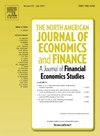资本市场制度开放与股价泡沫:来自中国的证据
IF 3.9
3区 经济学
Q1 BUSINESS, FINANCE
North American Journal of Economics and Finance
Pub Date : 2025-06-14
DOI:10.1016/j.najef.2025.102489
引用次数: 0
摘要
中国资本市场上散户的投机行为,如羊群行为(如动量交易和恐慌性抛售),导致了持续的股价泡沫。这些累积的泡沫严重损害了股票市场的健康发展。作为高水平资本市场开放的关键制度改革,a股纳入MSCI新兴市场指数提供了检验开放政策效果的准自然实验。本研究采用差分中的差分(DID)模型分析纳入MSCI对股价泡沫的影响及其潜在机制。研究结果表明,纳入MSCI指数显著加剧了股价泡沫的程度,这一结论对替代泡沫指标、延长样本周期和安慰剂测试都是有效的。机制分析表明,纳入MSCI通过提升投资者关注度和增强股票流动性,加剧了泡沫积累。具体而言,指数成分股吸引媒体报道和投资者搜索(以百度搜索指数为代表),提高股票流动性,放大非理性交易行为,推动股价偏离内在价值。异质性分析进一步发现信息透明度和公司治理是关键的调节渠道:泡沫加剧效应集中在信息透明度较低和公司治理较差的公司,因为这些公司更容易受到投资者情绪波动和市场未能披露负面信息的影响。本研究补充了与资本市场自由化相关的金融风险的相关文献,揭示了金融风险的形成路径,为政策制定者减轻金融脆弱性、减少股价泡沫、促进中国资本市场的高质量发展和进一步开放提供了新的见解。本文章由计算机程序翻译,如有差异,请以英文原文为准。
Institutional opening of capital market and stock price Bubble: Evidence from China
Speculative behaviors by retail investors in China’s capital markets, such as herding behaviors (e.g., momentum trading and panic selling), have led to persistent stock price bubbles. These accumulated bubbles severely undermine the healthy development of the equity market. As a critical institutional reform for high-level capital market openness, the inclusion of A-shares in the MSCI Emerging Markets Index provides a quasi-natural experiment to examine the effects of opening policies. This study employs a difference-in-differences (DID) model to analyze the impact of MSCI inclusion on stock price bubbles and its underlying mechanisms. The findings reveal that inclusion in the MSCI Index significantly exacerbates the degree of stock price bubbles, a conclusion robust to alternative bubble metrics, extended sample periods, and placebo tests. The mechanism analysis demonstrates that MSCI inclusion intensifies bubble accumulation through elevating investor attention and enhancing stock liquidity. Specifically, index constituent stocks attract heightened media coverage and investor searches (proxied by the Baidu Search Index), improve stock liquidity, and amplify irrational trading behavior, driving stock prices to deviate from intrinsic values. Heterogeneity analysis further identifies information transparency and corporate governance as key moderating channels: The bubble-aggravating effect is concentrated in firms with lower information transparency and poorer corporate governance, as these firms are more vulnerable to investor sentiment fluctuations and the market’s failure to disclose negative information. This study contributes to the literature on financial risks associated with capital market liberalization, uncovers the formation pathways of such risks, and provides novel insights for policymakers to mitigate financial vulnerabilities, reduce stock price bubbles, and foster the high-quality development and further opening of China’s capital markets.
求助全文
通过发布文献求助,成功后即可免费获取论文全文。
去求助
来源期刊
CiteScore
7.30
自引率
8.30%
发文量
168
期刊介绍:
The focus of the North-American Journal of Economics and Finance is on the economics of integration of goods, services, financial markets, at both regional and global levels with the role of economic policy in that process playing an important role. Both theoretical and empirical papers are welcome. Empirical and policy-related papers that rely on data and the experiences of countries outside North America are also welcome. Papers should offer concrete lessons about the ongoing process of globalization, or policy implications about how governments, domestic or international institutions, can improve the coordination of their activities. Empirical analysis should be capable of replication. Authors of accepted papers will be encouraged to supply data and computer programs.

 求助内容:
求助内容: 应助结果提醒方式:
应助结果提醒方式:


